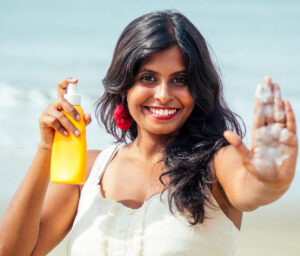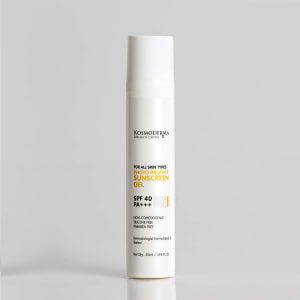Summer is here, and it's time to start taking care of your skin! Sun exposure during summer can lead to skin tan, which can be damaging to your skin in the long run. Skin tan is a common problem for people who live in areas with high sunlight intensity, and it's essential to take preventive measures to avoid skin damage. In this article, we'll discuss how to summer-proof your skin and share tips for dealing with sun tan.
Sun tan is the darkening of the skin caused by prolonged exposure to the sun's ultraviolet (UV) radiation. Excessive UV radiation can either cause sunburns (especially common in fairer skin tones) or skin tanning (more common in darker skin tones), skin ageing and even skin cancers. UV radiation causes DNA damage and our skin responds to it by producing more melanin to help protect the skin. An increase in melanin production can cause your skin to become darker, leading to skin tan.
Therefore, it's essential to take steps to protect your skin from sun damage and skin tan during the summer months when sun exposure is at its peak. One of the most effective ways to prevent skin tan is to use a broad-spectrum sunscreen with an appropriate SPF value. However, in addition to using sunscreen, there are other steps you can take to protect your skin from sun damage and skin tan, which we will explore further in this article. By following these tips from a doctor's perspective, you can reduce your risk of skin damage and skin tan, keeping your skin healthy and glowing all year round.
Importance of Sunscreen and Ideal SPF

Sunscreen is an essential part of summer skincare, and its importance cannot be overstated. Sunscreens protect your skin from harmful UV rays, preventing skin damage and skin tan. The ideal SPF for sunscreen varies depending on your skin type and the amount of sun exposure you're likely to face.
SPF, or Sun Protection Factor, measures the sunscreen's ability to block UVB rays, which are responsible for causing sunburn. The higher the SPF, the more protection your skin gets. Experts recommend using an SPF of at least 30, which blocks 97% of UVB rays. However, if you're planning to spend extended periods outdoors, a higher SPF sunscreen is recommended. In addition to protecting your skin from skin tan, sunscreens also offer several other benefits. Sunscreen helps prevent sunburn, reduces the risk of skin cancer, and slows down the ageing process. Exposure to UV radiation can cause fine lines, wrinkles, and age spots, and using a sunscreen with an appropriate SPF can help reduce the visible signs of ageing.
Moreover, using the right SPF is crucial for adequate sun protection. The SPF value indicates how long the sunscreen will protect your skin from UVB radiation. For instance, if you apply an SPF 30 sunscreen, it will take 30 times longer for your skin to burn than if you weren't wearing sunscreen. However, it's important to remember that no sunscreen offers complete protection from the sun's harmful rays. Therefore, it's essential to use other sun protection methods like wearing protective tightly woven clothing, seeking shade, and avoiding peak sun hours.

Furthermore, it's essential to choose a sunscreen that's appropriate for your skin type. People with dry skin may benefit from using a moisturising sunscreen, while those with oily skin may prefer a lightweight, oil-free formula. Additionally, people with sensitive skin should opt for a fragrance-free and hypoallergenic sunscreen to avoid skin irritation.
In conclusion, sunscreen is a crucial component of a
summer skincare routine, and using the right SPF is vital for optimal sun protection. By choosing the right sunscreen for your skin type and following other sun protection methods, you can keep your skin healthy and free from skin tan and other forms of sun damage.
Tips for Dealing with Sun Tan for Indian Skin:

Use a Good Sunscreen: Apply sunscreen with at least SPF 30 or higher 30 minutes before stepping out in the sun. Reapply every two hours, especially if you're swimming or sweating.
Wear Protective Clothing: Wearing tightly woven, light-coloured, loose-fitting clothes that cover your arms and legs can reduce your skin's exposure to the sun. You can also wear a broad-brimmed hat and sunglasses to protect your face and eyes.
Avoid Peak Sun Hours: The sun's rays are strongest between 10 am and 4 pm, so try to stay indoors during this time if possible. If you have to go out, seek shade whenever possible.
Use Skin Lightening Agents: There are various skin lightening agents available in the market that can help reduce skin tan. Ingredients like arbutin, and
vitamin C are effective in reducing the melanin pigment, leading to lighter and brighter skin.
Exfoliate Regularly: Exfoliating your skin can help remove dead skin cells and reduce skin tan. Use a gentle exfoliator twice a week to remove tan and reveal brighter skin.
Avoid using natural remedies as they can damage the skin.
Hydrate Your Skin: Drink plenty of water and use a moisturiser to
keep your skin hydrated. Dehydrated skin is more prone to skin damage and skin tan.
Be Gentle with Your Skin: Avoid using harsh soaps and scrubs that can damage your skin's natural barrier. Instead, use
gentle cleansers and moisturisers that are suitable for your skin type.
Avoid Hot Showers: Hot water can strip your skin of its natural oils, leading to dryness and skin damage. Use lukewarm water instead and limit your shower time to 10-15 minutes.
Seek Professional Help: If you have severe skin tan or sunburn, it's best to seek professional help. A dermatologist can prescribe medication or recommend treatments like chemical peels or laser therapy to remove skin tan.
Be Mindful of Medications: Some medications like antibiotics, acne medications, and birth control pills can make your skin more sensitive to the sun. If you're taking any medication, consult your doctor to see if it can increase your risk of skin damage.
Use a Humidifier: Air conditioning can dry out your skin, leading to skin damage and skin tan. Using a humidifier can help keep the air moist, reducing your skin's risk of damage.
Eat a Healthy Diet: A healthy diet rich in antioxidants can help protect your skin from damage. Include foods like berries, green leafy vegetables, and nuts in your diet to keep your skin healthy and glowing.
Be Consistent: Consistency is key when it comes to protecting your skin from sun damage and skin tan. Apply sunscreen regularly, even on cloudy days, and reapply every two hours if you're sweating or swimming.
Stay Cool: High temperatures and humidity can make your skin more prone to skin damage and skin tan. Stay cool by wearing lightweight, breathable clothing, and avoiding overly hot environments.

Conclusion
It's important to remember that consistent sun protection is key to keeping your skin healthy and free from damage.Additionally, protecting your eyes and lips from sun damage is equally important. By incorporating these tips into your summer skincare routine, you can enjoy the sunshine while keeping your skin healthy and glowing. Don't let skin tan or sun damage ruin your summer fun. With the right precautions and care, you can enjoy all that summer has to offer while keeping your skin safe and healthy.
Summer can be harsh on your skin, and sun tan is a common problem that many people face. However, taking preventive measures like wearing sunscreen, protective clothing, and avoiding peak sun hours can go a long way in protecting your skin from damage. If you do develop skin tan, following the tips mentioned above can help reduce the tan and restore your skin's brightness. Remember, prevention is always better than cure, so summer-proof your skin today!




